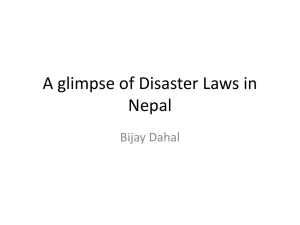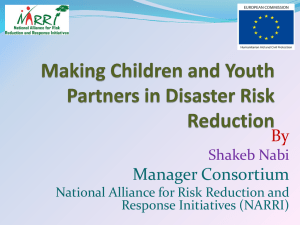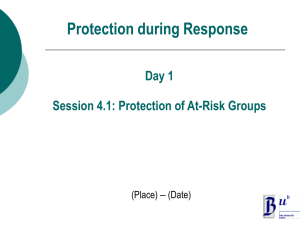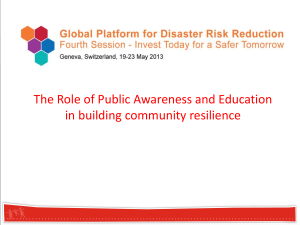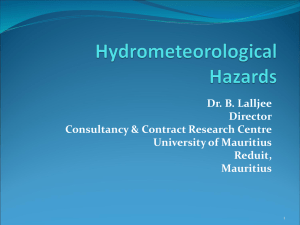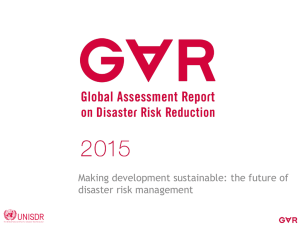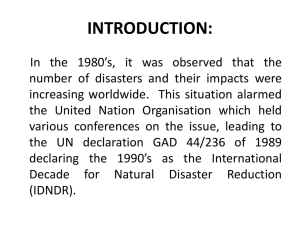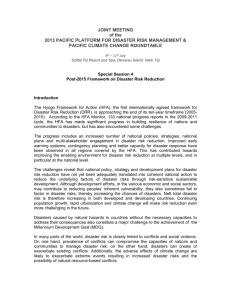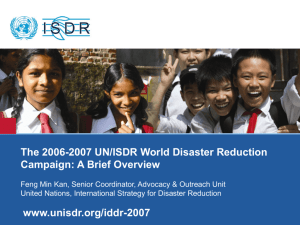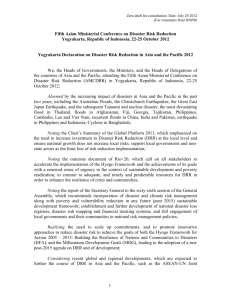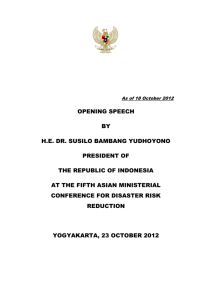IDDR satellite event in Meru Concept Note 09252013
advertisement
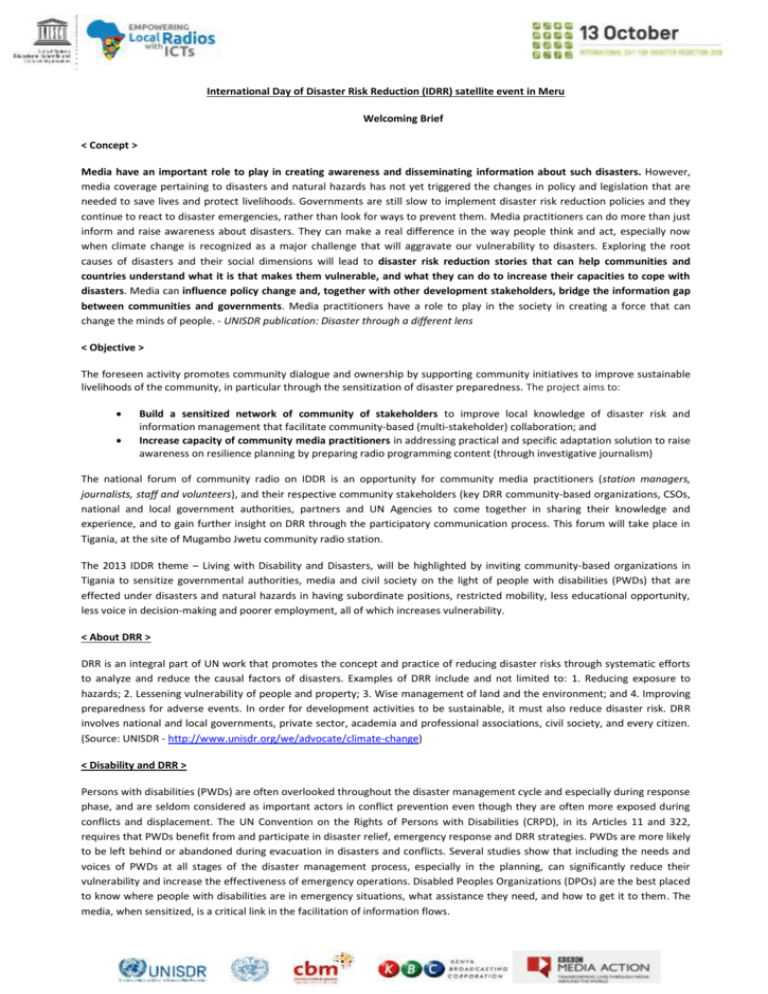
International Day of Disaster Risk Reduction (IDRR) satellite event in Meru Welcoming Brief < Concept > Media have an important role to play in creating awareness and disseminating information about such disasters. However, media coverage pertaining to disasters and natural hazards has not yet triggered the changes in policy and legislation that are needed to save lives and protect livelihoods. Governments are still slow to implement disaster risk reduction policies and they continue to react to disaster emergencies, rather than look for ways to prevent them. Media practitioners can do more than just inform and raise awareness about disasters. They can make a real difference in the way people think and act, especially now when climate change is recognized as a major challenge that will aggravate our vulnerability to disasters. Exploring the root causes of disasters and their social dimensions will lead to disaster risk reduction stories that can help communities and countries understand what it is that makes them vulnerable, and what they can do to increase their capacities to cope with disasters. Media can influence policy change and, together with other development stakeholders, bridge the information gap between communities and governments. Media practitioners have a role to play in the society in creating a force that can change the minds of people. - UNISDR publication: Disaster through a different lens < Objective > The foreseen activity promotes community dialogue and ownership by supporting community initiatives to improve sustainable livelihoods of the community, in particular through the sensitization of disaster preparedness. The project aims to: Build a sensitized network of community of stakeholders to improve local knowledge of disaster risk and information management that facilitate community-based (multi-stakeholder) collaboration; and Increase capacity of community media practitioners in addressing practical and specific adaptation solution to raise awareness on resilience planning by preparing radio programming content (through investigative journalism) The national forum of community radio on IDDR is an opportunity for community media practitioners (station managers, journalists, staff and volunteers), and their respective community stakeholders (key DRR community-based organizations, CSOs, national and local government authorities, partners and UN Agencies to come together in sharing their knowledge and experience, and to gain further insight on DRR through the participatory communication process. This forum will take place in Tigania, at the site of Mugambo Jwetu community radio station. The 2013 IDDR theme – Living with Disability and Disasters, will be highlighted by inviting community-based organizations in Tigania to sensitize governmental authorities, media and civil society on the light of people with disabilities (PWDs) that are effected under disasters and natural hazards in having subordinate positions, restricted mobility, less educational opportunity, less voice in decision-making and poorer employment, all of which increases vulnerability. < About DRR > DRR is an integral part of UN work that promotes the concept and practice of reducing disaster risks through systematic efforts to analyze and reduce the causal factors of disasters. Examples of DRR include and not limited to: 1. Reducing exposure to hazards; 2. Lessening vulnerability of people and property; 3. Wise management of land and the environment; and 4. Improving preparedness for adverse events. In order for development activities to be sustainable, it must also reduce disaster risk. DRR involves national and local governments, private sector, academia and professional associations, civil society, and every citizen. (Source: UNISDR - http://www.unisdr.org/we/advocate/climate-change) < Disability and DRR > Persons with disabilities (PWDs) are often overlooked throughout the disaster management cycle and especially during response phase, and are seldom considered as important actors in conflict prevention even though they are often more exposed during conflicts and displacement. The UN Convention on the Rights of Persons with Disabilities (CRPD), in its Articles 11 and 322, requires that PWDs benefit from and participate in disaster relief, emergency response and DRR strategies. PWDs are more likely to be left behind or abandoned during evacuation in disasters and conflicts. Several studies show that including the needs and voices of PWDs at all stages of the disaster management process, especially in the planning, can significantly reduce their vulnerability and increase the effectiveness of emergency operations. Disabled Peoples Organizations (DPOs) are the best placed to know where people with disabilities are in emergency situations, what assistance they need, and how to get it to them. The media, when sensitized, is a critical link in the facilitation of information flows. < Participating Stakeholders > SIDA community radio stations Sauti FM (98.1) from Asembo Bay Mwanedu FM (96.1) from Voi Radio Mangelete (89.1FM) from Mitito Andei Mug’ambo Jwetu Radio (102.3 FM) from Tigania National and local authorities on DRR National Disaster Operation Center Governor’s Office, Meru County Partners BBC Media Action Kenya Broadcasting Cooperation (KBC) CBM (Christian Blind Mission), SPARKS (Catholic Diocese of Meru) Other participating stakeholders Meru FM, Muga FM, County Focus Newspaper (Media organizations based in Meru) Kenya Telecom (KenTel) Kenya Community Media Network (KCOMNET) Kenya Association for the Intellectually Handicapped (KAIH) Kenya Red Cross Siaya Branch Baraka Orphans Meru North Disability Centre Luthili Vision Disability Centre Community Media Suport Kenya Community Network Kenya Telecenter UN Agencies UNESCO UNIC UNISDR
